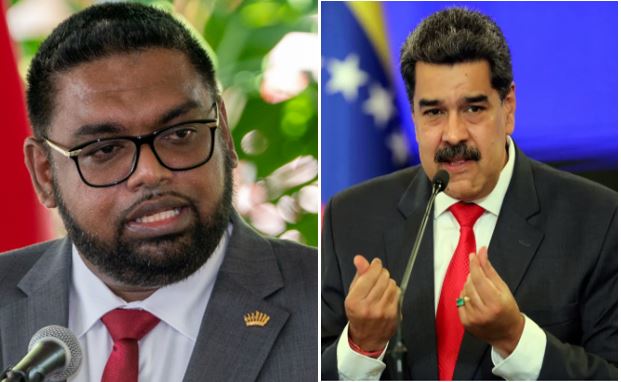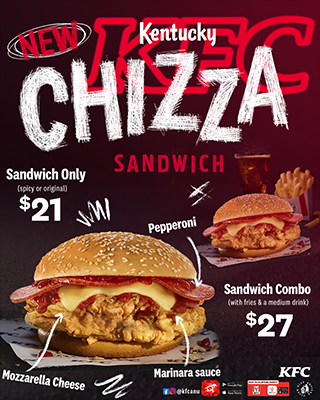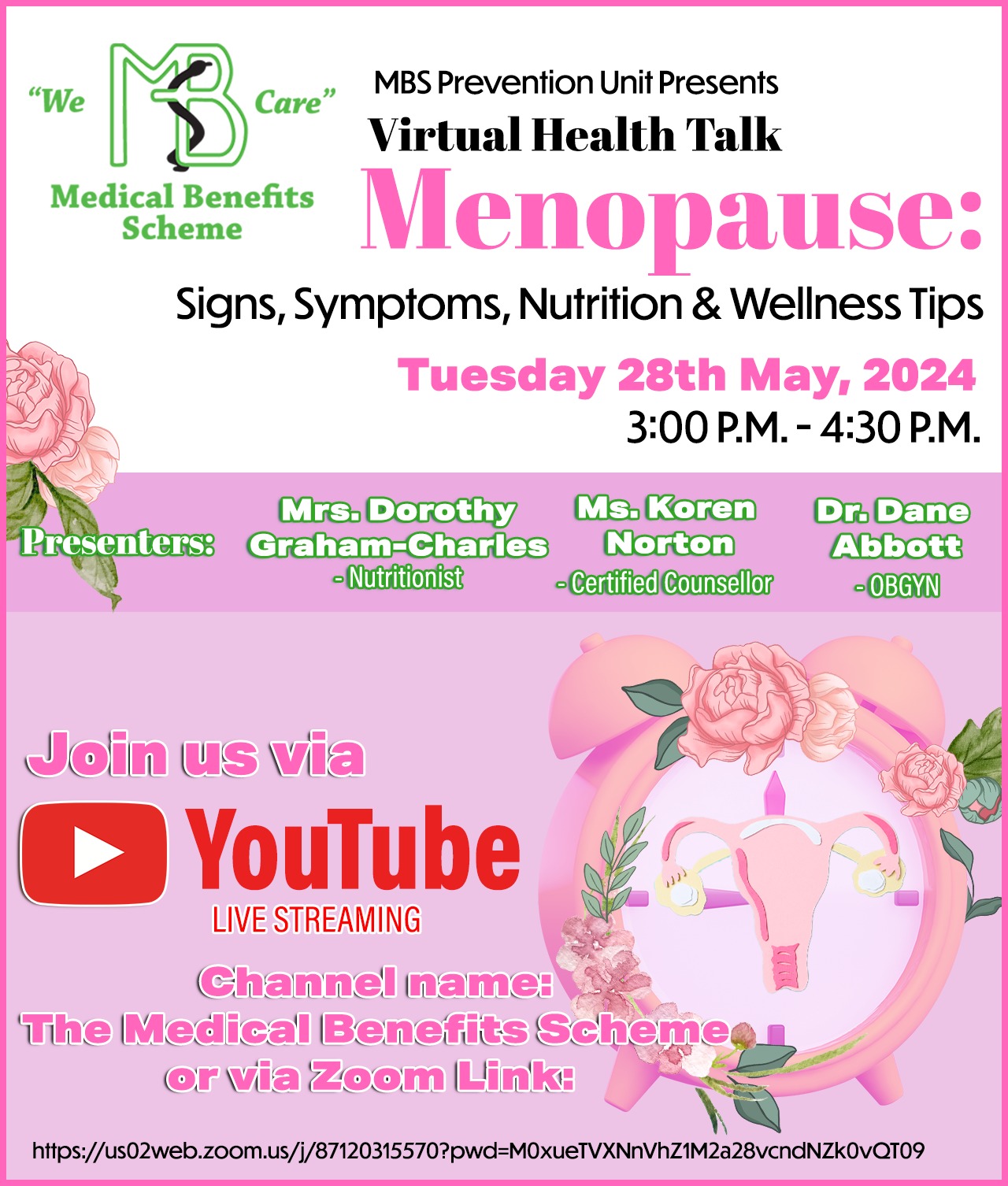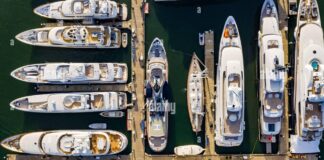
(AP) — A century-old territorial dispute deepened by the discovery of oil is boiling over between neighbors Guyana and Venezuela. Steeped in patriotism, the Venezuelan government is seizing on the fight to boost support ahead of a presidential election among a population fed up with a decade-long
crisis that has pushed many into poverty.
Venezuelans on Sunday approved a referendum to claim sovereignty over Essequibo, a mineral-rich territory that accounts for two-thirds of Guyana and lies near big offshore oil deposits.
Military confrontation appears unlikely for now, but several countries have echoed Guyana’s concerns over an annexation by its neighbor to the west.
These are some of the key aspects of the growing dispute:
WHY IS THE BORDER UNDER DISPUTE?
Venezuela says it was the victim of a land theft conspiracy in 1899, when Guyana was a British colony and arbitrators from Britain, Russia and the United States decided the boundary. The U.S. represented Venezuela in part because the Venezuelan government had broken off diplomatic relations with Britain.
Let us know what you think by adding a comment below. Click here to start now!
Venezuelan officials contends Americans and Europeans colluded to cheat their country out of the land. They also argue that an agreement among Venezuela, Britain and the colony of British Guiana signed in 1966 to resolve the dispute effectively nullified the original
Guyana maintains the initial accord is legal and binding and asked the United Nations’ top court in 2018 to rule it as such, but a decision is years away.
WHAT IS OIL’S ROLE?
In 2015, major oil deposits were first discovered off Essequibo’s shore by an ExxonMobil-led consortium, piquing the interest of Venezuela, whose commitment to pursuing the territorial claim has
fluctuated over the years.

The consortium began pumping oil in December 2019, converting largely agrarian Guyana into the world’s fourth-largest offshore oil producer. Operations generate some $1 billion a year for the
impoverished country of nearly 800,000 people that saw its economy expand by nearly 60% in the first half of this year.
The current daily production of some 380,000 barrels is expected to hit 800,000 barrels in upcoming years. Guyana’s crude exports were heading largely to the Netherlands and Panama last month, with
much of the oil from Panama then re-exported to the U.S. West Coast, according to S&P Global.
In September, Guyana opened bids for 14 additional offshore oil blocks available for exploration and development, with six companies and groups submitting bids. Among them were ExxonMobil, which teamed up again with U.S.-owned Hess Corp. and China National Offshore Oil Corp., and French-owned Total Energies, which partnered with companies in Qatar and Malaysia.
While Guyana’s oil industry has boomed, Venezuela’s has plummeted. Venezuela has the world’s largest proven crude reserves, but its oil industry has been crippled by years of mismanagement and economic sanctions imposed on the state-owned oil company following President Nicolas Maduro’s re-election in 2018, which was widely considered fraudulent.
Venezuela’s National Assembly has not released the text of the law it will use to try to enforce the referendum results. But a portion lawmakers discussed Thursday would ban local and foreign companies from operating in Venezuela if they also do business in Guyana.
WHY MADURO’S INTEREST IN ESSEQUIBO NOW?
For Maduro and his ruling party, the Essequibo dispute is an opportunity to drum up internal support and to distract Venezuelans from U.S. pressure to release political prisoners and wrongfully detained Americans as well as to guarantee free and fair conditions in next year’s presidential election.

Before the Dec. 3 referendum, Venezuelans were bombarded for weeks with Essequibo-themed music, nationally televised history lessons, murals, rallies and social media content.
That appears to have backfired.
The government claims about 10.5 million people — just over half of eligible voters — cast ballots. It says voters approved rejecting “by all means” the 1899 boundary, turning Essequibo into a state, giving area residents Venezuelan citizenship and rejecting the U.N. court’s jurisdiction over the dispute. But Associated Press journalists and witnesses at voting centers said the long lines typical of Venezuelan elections never formed.
WHAT’S NEXT?
Maduro’s government on Saturday announced in a statement it had accepted a proposal “to hold a high-level meeting” with Guyana to preserve its “aspiration to maintain Latin America and the Caribbean as a zone of peace, without interference from external actors.”
Maduro “received” the proposal in conversations with Brazil President Luiz Inacio Lula da Silva and Prime Minister of Saint Vincent and the Grenadines, Ralph Gonsalves, according to the statement. It was not immediately clear Saturday if Guyana’s government agreed to participate in the meeting, which was yet to be scheduled.
Meanwhile, international security firm Global Guardian expects Venezuela to gradually ramp up tensions and go as far as conducting naval exercises near Guyana, said Zev Faintuch, a senior
intelligence analyst at the firm.
“We might even see some sort of very small scale, cross-border activity,” he said, adding that he expects activities to escalate until elections are held in Venezuela. “Maduro’s interest is to get himself reelected and get some more of his oil onto oil markets.”
He said that it would be nearly impossible to invade the entire Essequibo region, which is vast, lacks roads and is sparsely populated.
Guyanan Vice President Bharrat Jagdeo on Thursday urged oil companies that have concessions near the Essequibo region to ignore Maduro’s comments and actions and warned Guyana would take any
necessary steps to protect its sovereignty.
“Any attempts by his state oil firms or state corporations to explore for petroleum in our area will be viewed as an intrusion by Guyana,” Jagdeo said. “If (Maduro) believes that belligerence and threatening Guyana will lead to the desired bilateral conversations, he is profoundly incorrect.”
The U.N. Security Council held an emergency, private meeting on the issue Friday as world leaders and international organizations backed Guyana. Separately, members of a regional trade bloc known as
Caricom also called a closed-door meeting Friday to talk about the dispute.
The Organization of American States said in a statement that the 1899 boundary is “in force and legally binding on all parties under international law.” It also accused Maduro’s government of taking an “aggressive stance” and of “continuing to take and promote unlawful actions against Guyana.”
The organization added that it was profoundly worried about the situation, “which has escalated to a point of significant concern for regional security and constitutes a matter that threatens the stability and territorial sovereignty within our hemisphere.”
Advertise with the mоѕt vіѕіtеd nеwѕ ѕіtе іn Antigua!
We offer fully customizable and flexible digital marketing packages.
Contact us at [email protected]














After reading the first paragraph, I wasn’t in the slightest bit surprised that those mad and devisive colonialists from the UK (that Antigua still tie themselves to up to today) were somehow involved. Tsk, tsk … tsk!!!
🎶”UK, Dem Ah Laugh 😂 And Ah Giggy Giggy …”🎶
Brix you are very un-educated on your history. Let me put it like this. You grand parents stole lands from my grand parents and then gave it as an inherent to you. Now I come and claim the land that you said you got from your grand parents. Whose land is it really?
We all from the african linage were brought here by the Brithish colonizers, whe have been given land that they stole from the indiginous people. Most of the time they killed them off and drove them out of the islands. I belive Dominica still have some indiginous people. Yet we now claim that these are our lands. This is where we born and this is what we have made our home. But is this really our land. The same fate was meted out to the American Indian. Now the decendants of Europe claim it is their land.
But that is reality. That is the world today. We are lucky to still have Africa as the home for ALL the black people. Sadly we never care to go back home.
🥱 … I dozed off after the word “Brix”, sorry ’bout dat Sidey; I’ll try harder next time. I promise! 🤞🏾
Also do try to break-up your paragraphs, sentences and grammar into READABLE sections. Please!
YOUR WRITING IS HARD TO FOLLOW – JUST TRYING TO HELP YOU OUT 😁
Very deep… and you are so right!
I think most of today’s problems are caused by people who look backwards instead of forward. They live in the past and try to fix it. But it’s passed. We have to deal with reality and the future. Stop referring to something happened 100 or 200 or 1,000 years ago. Try to make today and tomorrow to be better than yesterday for everyone.
Maybe it will be fair to return this land to indigenous people of Essequibo if anyone left?
The most sad part of this story is that Venezuela didn’t care much about this land until the oil production has started. Clearly it has nothing to do with “historical fairness and justice”, but obvious greed!
Distractions…
The earth is the Lord’s. The land belongs to All of us. We all have a right to live and access the natural resources we need to survive and thrive. All humans originated in Africa. As people settled in new regions, they claimed “ownership”. To keep the peace, other humans typically respect our man-made boundaries. Who should get the land? Maybe it should be shared by whoever is already there today not in the past and whoever needs it to live? Maybe do like Solomon and draw a line somewhere to divide it?
The problem with looking to the past to decide ownership is we are mostly all mixed on this side of the world. I’m not an expert, but I sometimes like to watch those DNA reveal videos on YouTube. Many people in South America, North America and the Caribbean are a mix of “black”, “white”, and “Amerindian”. “Amerindians” are related genetically to Chinese. So, we are a mix of all major “races”. Many of us are very high in the “black” but are still “mixed”. Others are more visibly “mixed”. Some men who look very “black” actually have Y chromosomes from their European male ancestors. The blackness comes from their great… grandmother’s side. Arabs etc. living here are also “mixed” because of their origins in the Middle East between all the “racial” groups. For those of us descended from the era of slavery in these parts, naturally people prefer to disassociate themselves from the oppressors (slave owners) and associate with the more innocent (slaves and Amerindians). However, in reality none of us would exist without all of those ancestors both innocent and guilty. So, in reality, some of our ancestors mistreated other ancestors. None of us were there at the time. Since we are mixed descendents from history, these decisions should be made from the current situation, not the past.
Comments are closed.